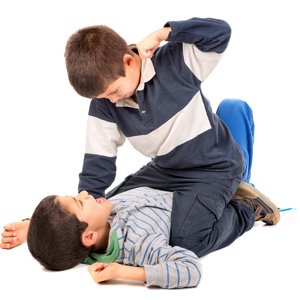There are many ways to motivate and train children that do not involve formal correction.
Why Correction Is Necessary
Using discipline is often unpleasant for parents and children. Due to this potential unpleasantness, we tend to avoid or procrastinate correcting poor behavior. We make excuses for our child (or ourselves) and hope that the bad behavior disappears. However, children sometimes exhibit behavior that must be quickly eliminated.
In cases where a child is hurting someone on purpose or defying parental authority, knowing appropriate and effective methods of correction can help nip inappropriate behavior in the bud.” says Angela Worth LMFT “Having the appropriate tools, can help parents to intervene quickly and consistently which leads to better results.”
I use discipline carefully because I do not enjoy it. It is a happy coincidence that it is more effective when it is used sparingly. I prefer to shape behavior I want to see thru positive parenting practices. In fact, my children only get “disciplined” for causing someone pain on purpose or outright defiance.
Causing Pain
Children often use their bodies to express their emotions. Kids will stomp their feet, cry, and even flail about on the ground in an effort to express what they are feeling. Children also have low impulse control. The desire to express emotions physically and a low ability to control themselves, leads to problems when your child feels angry or attacked. It is natural for kids to become aggressive and to hit, kick, bite and scratch, but that doesn’t make it OK.
It is important that children learn how to control the impulse to cause pain and learn more appropriate ways to express and release strong emotions. Time-Out is my go to discipline strategy for teaching kids to control themselves.
Defiance
Defiance is the bold resistance of authority. Parents need to be in charge when it comes to family dynamics. Children want to decide many things for themselves, but they do not have the maturity or life experiences to do so safely. As a parent you get to decide which choices your child controls. For example, you might be fine with them choosing which pajamas to wear, but not OK with whether or not they go to school. Embrace this truth, you are the boss.
You are the boss, it is important to teach your child that they must follow your instructions.” says Angela Worth LMFT, “In an ideal world, you would always have time to explain your reasons to your children, but in real life situations, sometimes they need to act first and get explanations later.”
Disobedience should be immediately addressed. Depending on the age of the child I recommend Time-Out or Loss of Privilege to address defiance.
Avoid Unnecessary Confrontations
Consistency is the key to success when it comes to creating new habits and patterns of behavior. However, children have ups and downs. Being hungry, tired, or sick can all contribute to a decline in behavior. Often my kid’s bad day becomes my bad day. If they didn’t sleep, there is a good chance that I didn’t sleep. When my kid is sick, I am probably also feeling under the weather (or just disgusted from having to deal with too many bodily fluids.) Do yourself and your kids a favor on bad days, try to cut them some slack. I try to develop a mysterious blindness and deafness in regards to whining, crying yelling and pouting. Certain bad behaviors may still need to be addressed, but I always try to avoid asking my kids to do too much, so we won’t get caught in an unnecessary battle of wills.
Choosing Tough Love
Discipline and correction are tough love. It isn’t fun and it takes a toll on both the parent and the child. Disciplining a child who is acting inappropriately, is sacrificing the ease of today and choosing to work hard because it will lead to a better and more successful tomorrow. Love your child enough to help them become the person they need to be to successfully navigate thru life.
If you find you are caught in a cycle of discipline with your child, remember that this is a form of love. However, correction does put a strain on the parent/child relationship. When the punishment is over, find ways to spend positive time together. Try to carve out time for just the two of you to do something you both enjoy. This can be something simple like finger painting or swinging at the park. It can be something more elaborate like going for ice scream or seeing a movie.
These positive experiences are so essential to the process that I think of them as the final step in discipline. When you take the time to reconnect with your child after the consequence is complete, you teach them that while the behavior was unacceptable they are still loved. A positive experience will reinforce for you and your child that you are providing discipline because you love and care about them. This pleasant interaction will help to strengthen the relationship and remind both of you why it is worth working together towards a good relationship.







